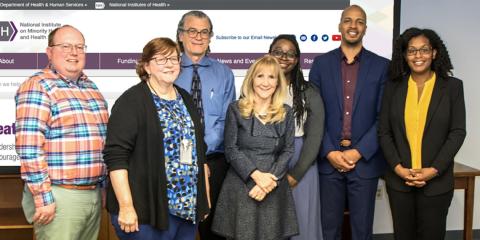Fordham Scholars Visit for Ethics Training

Photo: Edgar Dews
Dr. Celia Fisher, director of the National Institute on Drug Abuse-supported HIV and Drug Abuse Prevention Research Ethics Training Institute (RETI) at Fordham University, brought four early-stage investigators to the National Institute on Minority Health and Health Disparities recently. Each of the scholars presented their bioethics research on a minority health and health disparities research topic and met individually with program officers. Several of the scholars examined their bioethical questions using NIMHD-supported research projects. The exchange was to provide NIMHD staff with examples of current applications of bioethical investigations on minority health and health disparities research and offer the investigators insights into how to successfully navigate NIH and NIMHD.
Dr. Anthony Estreet, associate professor at Morgan State University, shared his work in examining barriers and motivators to research participation among young black men who have sex with men (MSM) HIV-positive substance users. Estreet is investigating the intersection of research mistrust, perceived personal and group benefits of participation and the fair versus coercive influence of monetary and medical incentives on research participation among young black MSM.
Dr. Randy Hubach, assistant professor at Oklahoma State University, discussed his project, which details the barriers to and preferences for MSM participating in research studies that use electronic devices for the collection, storage and maintenance of data.
Dr. Stacy Ryan, assistant professor of psychology at Baylor University, discussed her study exploring youth in the justice system and their willingness to participate in substance use treatment research that measures drug use and related problematic behaviors when protocols include any disclosure of information to probation.
Aaliyah Gray, doctoral candidate at Fordham, presented her study exploring the associations among sexual identity, social and systemic factors and sexual risk factors among black lesbian, gay and bisexual women (BLGB). The findings suggest family, community and individual health care providers can play a positive role in sexual identity, and in turn, lead to greater sexual self-efficacy among BLGB having sex with men.
Fisher closed the session with a discussion of best practices for minority health and health disparities research in light of big data combining genomic, social and behavioral data and the new human subject protection rules allowing broad consent.
